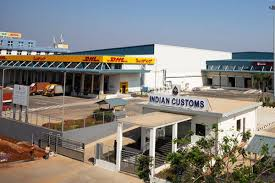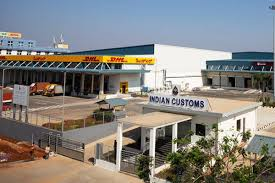
cargo
Table of Contents
India’s Largest Domestic Cargo Terminal Launched at Bengaluru International Airport
Bengaluru, February 2025 – The Bengaluru International Airport (BLR) has achieved a significant milestone with the launch of India’s largest domestic cargo terminal. This development is a major step forward in enhancing India’s logistics and supply chain infrastructure, positioning the airport as a key hub for both national and international cargo movement. The inauguration marks a momentous occasion for the aviation and logistics sectors, which are essential to the nation’s economic growth.
Vision and Impact of the New Cargo Terminal
The terminal, which spans over 200,000 square feet, is designed to handle a wide variety of goods, from perishables and pharmaceuticals to electronics and textiles. With the rise in demand for domestic and international cargo transport, the new terminal aims to address the increasing logistical needs of India, a country with a rapidly growing economy and a burgeoning e-commerce sector. By improving operational efficiency, reducing turnaround times, and increasing storage capacity, this terminal will play a critical role in facilitating smoother, faster, and more cost-effective cargo movement.
Strategic Importance
Bengaluru has long been a key player in India’s aviation landscape. The city is known for its status as the country’s Silicon Valley, as well as its strong presence in industries such as aerospace, IT, pharmaceuticals, and biotechnology. As India’s leading tech city, it has witnessed a significant increase in the demand for high-tech components and products. This new cargo terminal is designed to meet the growing needs of both manufacturers and consumers.
The terminal’s strategic location at Bengaluru International Airport further enhances its value. The airport serves as a gateway for both international flights and domestic connections, making it a crucial node in India’s supply chain network. The terminal is expected to handle a broad range of cargo, including high-value goods, perishables, pharmaceuticals, and even temperature-sensitive products, which are particularly important in industries like healthcare and food.
Features of the New Cargo Terminal

The newly launched cargo terminal comes equipped with state-of-the-art technology, robust infrastructure, and modern facilities to ensure it meets the highest standards of operational efficiency and security. Some of the notable features include:
- High-Capacity Infrastructure
The cargo terminal is designed with ample space to handle a wide variety of goods, from oversized freight to standard cargo. The facility is capable of processing over 400,000 tons of cargo annually, which makes it India’s largest domestic cargo facility by volume. This capacity is expected to increase in the future as demand for air cargo transport grows. - Automated and Advanced Handling Systems
One of the key highlights of the new terminal is its automated cargo handling system. This system uses robotics and conveyor belts to transport goods quickly and efficiently, reducing human intervention and minimizing the chances of errors. The advanced systems also help optimize the use of available space and streamline operations, leading to faster processing times and quicker turnaround times for cargo shipments. - Cold Storage and Temperature-Controlled Facilities
With the rise in demand for perishable goods such as fruits, vegetables, seafood, and pharmaceuticals, the terminal has dedicated temperature-controlled facilities. These cold storage areas are designed to maintain the integrity of sensitive cargo, ensuring that products like vaccines, medicines, and fresh produce arrive at their destinations in optimal condition. - Enhanced Security Measures
In keeping with global standards for airport security, the new cargo terminal is equipped with the latest in surveillance and screening technology. Cargo is thoroughly checked using advanced scanning systems, ensuring compliance with security protocols and preventing the transportation of illicit goods. The terminal also adheres to stringent international safety and security standards, enhancing the overall trust in the facility. - Dedicated Cargo Zones
The terminal features specialized zones for different types of goods, including electronics, textiles, pharmaceuticals, and perishables. This zoning approach helps in managing the diverse needs of different industries and ensures that cargo is handled in the most appropriate manner for its nature. - E-Commerce Integration
India’s booming e-commerce sector is another significant beneficiary of the new terminal. The terminal features dedicated e-commerce logistics zones, ensuring fast and efficient handling of e-commerce shipments. This integration is particularly important as online retail continues to grow in India, and the ability to ship goods quickly and efficiently is key to satisfying customer expectations.
Technological Advancements and Environmental Considerations
In line with the growing global emphasis on sustainability and technology integration, the new cargo terminal also boasts numerous eco-friendly and tech-driven features. These include energy-efficient lighting, solar panels, and a commitment to reducing carbon emissions from its operations. The use of automation also helps reduce waste, contributing to the terminal’s environmentally conscious approach.
Moreover, the terminal is integrated with the latest logistics technologies, including artificial intelligence (AI), Internet of Things (IoT) devices, and data analytics, enabling real-time tracking and monitoring of cargo. This not only improves operational efficiency but also offers greater transparency for businesses and consumers, who can track their shipments in real-time.
Benefits to the Indian Economy
The launch of this cargo terminal is expected to have far-reaching benefits for the Indian economy, particularly in the areas of trade, logistics, and industry development. It is expected to contribute significantly to India’s position as a global leader in air cargo transportation, making the country more competitive in the global supply chain.
- Boost to Export and Import
With enhanced capacity and faster processing times, the new cargo terminal will enable Indian exporters and importers to handle their goods more efficiently, reducing lead times and costs. This could lead to an increase in trade volumes and greater access to international markets, ultimately benefiting businesses across various sectors. - Job Creation
The expansion of the cargo terminal will also create a significant number of jobs in logistics, operations, security, and other related sectors. As the logistics and aviation sectors continue to grow, they will play an important role in employment generation and economic development. - Attraction of Foreign Investments
Improved infrastructure often serves as a catalyst for foreign direct investment (FDI). With India’s infrastructure rapidly improving, including this new cargo terminal, foreign companies may be more inclined to invest in the country’s logistics and manufacturing sectors, knowing that they will have access to world-class facilities for transporting goods. - Enhancing Bengaluru’s Position as a Global Logistics Hub
Bengaluru, already known for its strong tech industry, is now set to become a more critical player in global logistics. This cargo terminal will further elevate the city’s status as a hub for not only technology and innovation but also logistics and international trade.
The Future of Indian Air Cargo
The inauguration of the largest domestic cargo terminal at Bengaluru International Airport reflects the broader transformation happening in the Indian logistics and aviation sectors. As the country’s demand for air cargo continues to grow, infrastructure development like this will help India keep pace with international trade and remain competitive in global markets. The terminal is just one of many similar projects planned across the country to modernize the logistics sector and boost India’s economic potential.
In conclusion, the launch of India’s largest domestic cargo terminal at Bengaluru International Airport marks a new chapter in India’s logistics and aviation industry. With its cutting-edge technology, advanced handling systems, and state-of-the-art infrastructure, the terminal is set to play a pivotal role in strengthening India’s position in the global supply chain and contributing to the growth of the Indian economy. This investment in logistics infrastructure will not only enhance cargo movement but also provide a boost to key industries such as e-commerce, pharmaceuticals, and manufacturing, ultimately benefiting the economy as a whole.









